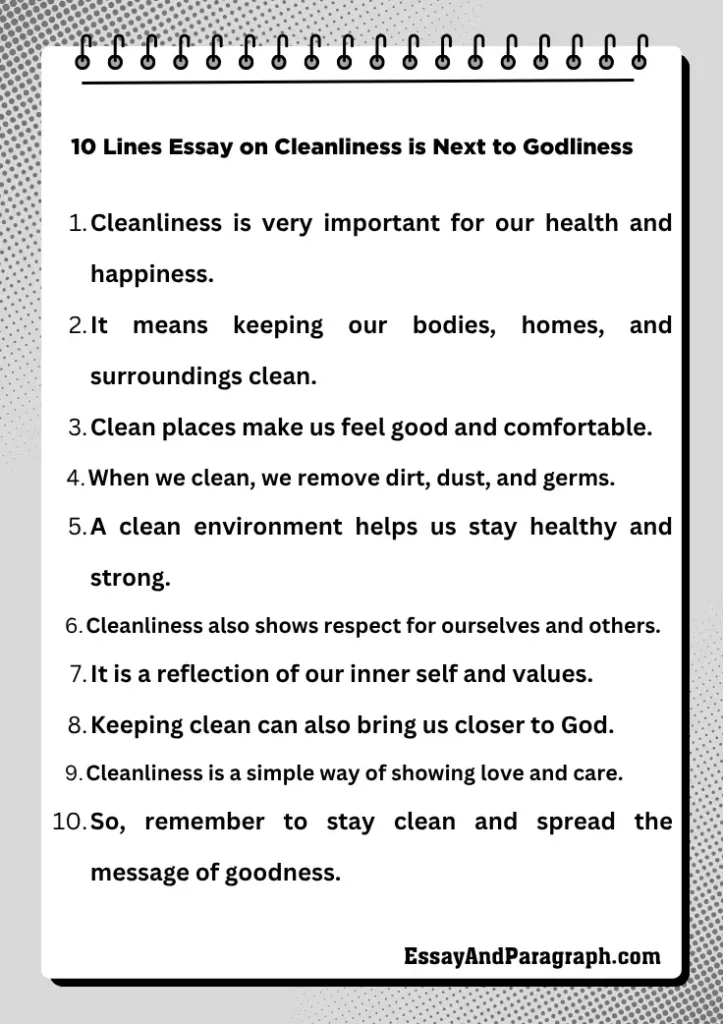Ever heard the saying, “Cleanliness is next to Godliness”? It’s a simple phrase that has been passed down through generations. The idea behind it is that keeping ourselves and our surroundings clean is not only important for physical health but also for spiritual well-being. In fact, it reflects a deeper moral and ethical value that encourages us to live in harmony with our surroundings. In this article, we will learn how to write an essay on “Cleanliness is Next to Godliness,” breaking it down into different sections for easy understanding.
10 Lines Essay on Cleanliness is Next to Godliness
Cleanliness is very important for our health and happiness.
It means keeping our bodies, homes, and surroundings clean.
Clean places make us feel good and comfortable.
When we clean, we remove dirt, dust, and germs.
A clean environment helps us stay healthy and strong.
Cleanliness also shows respect for ourselves and others.
It is a reflection of our inner self and values.
Keeping clean can also bring us closer to God.
Cleanliness is a simple way of showing love and care.
So, remember to stay clean and spread the message of goodness.

Short Essay on Cleanliness is Next to Godliness – 100 Words
Cleanliness is an essential part of our lives. It is not just about keeping our homes neat but also about taking care of our body and mind. The phrase “Cleanliness is next to Godliness” teaches us that being clean and organized brings peace and health. When we clean our surroundings, we make them pleasant and safe. A clean environment reflects a clean heart, and it allows us to connect better with others. Being clean shows respect for our health and well-being. It’s a small but powerful way to stay connected to goodness, peace, and God.
Essay on Cleanliness is Next to Godliness – 150 Words
Essay on Cleanliness is Next to Godliness – 200 words
Cleanliness is not just a habit; it’s a way of life that reflects our inner purity. The saying “Cleanliness is next to Godliness” emphasizes the importance of maintaining cleanliness in all aspects of life. It means that just as God is pure, we should also try to live with purity through cleanliness. Our body is like a temple, and keeping it clean is essential for health and well-being. Regular bathing, washing hands, and brushing teeth are all simple steps that keep us healthy.
But cleanliness is not only about personal hygiene. It also extends to our surroundings. Keeping our homes, schools, and workspaces clean makes the environment pleasant and free from harmful germs. It promotes a sense of peace and order. Cleanliness teaches us to respect ourselves and others, creating a peaceful and positive atmosphere around us. It helps us stay organized and focused, making daily tasks easier and more enjoyable.
In conclusion, cleanliness is an important part of a healthy and happy life. It’s not just about being clean; it’s about living a life full of respect, discipline, and care for ourselves and the world around us.
Cleanliness plays a vital role in maintaining good health and a peaceful environment. The phrase “Cleanliness is next to Godliness” reminds us that cleanliness is not just about physical hygiene, but also a reflection of our inner values. When we clean our surroundings, we remove dirt, germs, and unnecessary distractions that can affect our well-being. Keeping our homes and ourselves clean also teaches discipline, respect, and responsibility.
On a deeper level, cleanliness is seen as a spiritual practice. Just as we take care of our bodies, we must also take care of our soul. By being clean and organized, we show respect for the environment, others, and ourselves. Cleanliness connects us with higher values and brings peace to our minds.
Moreover, cleanliness has a direct impact on our interactions with others. A clean home or workspace makes it easier to build relationships and create positive experiences. It helps us stay focused, calm, and productive. Cleanliness can also bring us closer to God by maintaining an environment conducive to peace and clarity. Thus, it is essential to make cleanliness a part of our daily lives for a happier and healthier future.
Long Essay on Cleanliness is Next to Godliness – 500 words
Cleanliness is not just an outward display of order, but a reflection of our inner sense of discipline and respect for ourselves and others. The famous saying, “Cleanliness is next to Godliness,” carries profound wisdom. It suggests that keeping ourselves and our environment clean is closely linked to leading a virtuous and godly life. In a world filled with distractions and chaos, cleanliness is a simple yet powerful practice that helps us stay focused on what truly matters – health, peace, and respect.
The importance of cleanliness can be seen in both physical and spiritual aspects of life. Physically, cleanliness helps us maintain good health by preventing the spread of germs, diseases, and infections. A clean body and environment make us feel refreshed and energized, setting the stage for a productive day. Personal hygiene, like washing our hands, brushing our teeth, and bathing regularly, ensures that we stay free from illness and maintain a positive self-image.
However, cleanliness goes beyond just physical well-being. It is also about mental clarity. A clean and organized environment reduces stress and helps improve focus. When our surroundings are free from clutter, we are better able to think clearly and concentrate on tasks without distractions. A tidy space is not only aesthetically pleasing but also supports better productivity and creativity.
Spiritual cleanliness, as suggested by the phrase, is equally significant. In many religious teachings, purity is considered a path to spiritual enlightenment. Keeping our mind, heart, and soul free from negative thoughts and actions is just as important as maintaining a clean body. When we practice kindness, honesty, and compassion, we maintain spiritual cleanliness that brings us closer to our higher selves and to God.
Moreover, cleanliness is a sign of respect for others. When we keep our homes, schools, and workplaces clean, we show consideration for the people around us. It creates an atmosphere of harmony and well-being. In societies where cleanliness is prioritized, there is less likelihood of illness and greater community cooperation. People tend to live healthier and happier lives in clean environments.
In conclusion, cleanliness is a practice that encompasses both physical and spiritual aspects of life. It teaches us respect, discipline, and care for ourselves and others. By maintaining cleanliness, we create a positive environment that fosters well-being, productivity, and peace. As the saying goes, “Cleanliness is next to Godliness,” and by practicing it, we come closer to living a godly and virtuous life.
FAQs
1. What does “Cleanliness is next to Godliness” mean?
“Cleanliness is next to Godliness” means that being clean is a reflection of spiritual purity and a virtuous life. It emphasizes the importance of physical and mental cleanliness in achieving a peaceful and righteous life.
2. How does cleanliness affect our health?
Cleanliness helps prevent the spread of diseases and infections. By keeping our environment clean, we remove harmful bacteria and germs that can cause illnesses. It also encourages good hygiene practices, which are essential for maintaining overall health.
3. Can cleanliness improve mental well-being?
Yes, a clean environment promotes a sense of calm and clarity. It reduces stress and anxiety by creating a peaceful and organized space. Cleanliness can also boost self-esteem, as it is a reflection of self-care and discipline.
4. Why is cleanliness important in our daily life?
Cleanliness is important in daily life because it helps maintain a healthy and safe environment. It also teaches us valuable life skills such as responsibility, organization, and respect for others and the environment.
5. How can I make cleanliness a habit?
To make cleanliness a habit, start with small tasks like making your bed, cleaning up after meals, and organizing your personal space. Gradually, it will become a natural part of your daily routine. Remember, consistency is key!
6. What is the connection between cleanliness and spirituality?
Cleanliness is often seen as a spiritual practice. In many cultures, keeping clean is a way of honoring the divine and reflecting inner purity. A clean environment allows for clarity of thought and a deeper connection with spiritual beliefs.
Top 5 Quotes on Cleanliness is Next to Godliness
“Cleanliness is not just about keeping your home tidy, it’s about maintaining harmony in your life.”
“A clean space is a reflection of a peaceful mind.”
“Godliness comes with purity, and purity starts with cleanliness.”
“When you clean your environment, you also clean your soul.”
“Cleanliness is the foundation of a healthy and peaceful life.”
Summary :
Cleanliness is much more than just a routine or task – it is a way of life. The saying “Cleanliness is next to Godliness” encourages us to keep our surroundings, ourselves, and our minds clean. When we live in a clean space, we not only improve our health but also nurture our spiritual well-being. Cleanliness fosters discipline, peace, and respect. It connects us with higher values and helps us create positive relationships with others. By making cleanliness a part of our daily routine, we can lead a healthier, happier, and more spiritually fulfilling life.




